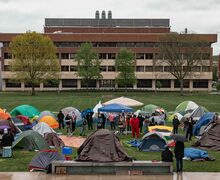Campus group raises fracking awareness
Margaret Lin | Staff Photographer
The New York Public Interest Research Group chapter at SU and SUNY-ESF placed multiple mock tombstones on campus to spread awareness on hydrofracking’s dangers and environmental risks.
The fight to keep hydrofracking out of New York state has remained an ongoing effort by grassroots activist groups, in which they educate the public about the hazards of fracking.
“The fact that (fracking) in New York state has been delayed for five years is proof that we are winning,” said Nicole St. James, a representative of the New York Public Interest Research Group assigned to Syracuse University.
Global Frackdown is a series of events meant to spread public awareness of hydrofracking, St. James said. Syracuse University and the State University of New York College of Environmental Science and Forestry chapter of NYPIRG participated by setting up various demonstrations against fracking on campus, including fake tombstones with written messages such as “RIP Public Health” on the lawn located between Schine Student Center and the S.I. Newhouse School of Public Communications.
“We like to have demonstrations and visuals,” St. James said. “It really shows the students what we are all about and may spark their interest so that they go research it or want to get involved.”
Parts of Central New York sit atop the natural gas-rich Marcellus Shale. The Marcellus Shale has sparked heated debate about whether the monetary benefits of fracking would outweigh the environmental damages caused by fracking, according to the New York Department of Environmental Conservation.
As part of Global Frackdown, NYPIRG organized a panel on Saturday afternoon that addressed the effects of fracking on local communities. The panel consisted of both anti-fracking activists and members of the Haudenosaunee, who St. James claims started the grassroots movements against fracking in Syracuse.
For some, hydrofracking is a cash cow that has the potential to generate billions of dollars in revenue, said Matt Lemke, NYPIRG’s anti-hydrofracking coordinator. In the panel, Lemke said hydrofracking takes a toll on the environment that far outweighs the monetary benefits, which has prompted action from activist groups like NYPIRG.
“The oil and gas companies aren’t going to give up their cash cow, we fracktivists have to make it happen,” Lemke said.
Hydrofracking has taken center stage among NYPIRG’s campaign efforts at SU this semester, St. James said. Campaigning at SU and within the Central New York community takes a three-pronged approach, Lemke said. The organization focuses on campus education, community outreach and training activists to lobby in Albany, N.Y., all in an effort to promote education about the effects of hydrofracking. The Haudenosaunee have been instrumental in this process, St. James said, by focusing on local land preservation.
“We have a responsibility to act as caretakers of the natural world. When oil and gas companies consider contaminating ground water we question their logic of collateral damage as an accepted risk,” said Curtis Waterman, a member of the Haudenosaunee Environmental Task Force and a panelist at Saturday’s event.
Hydrofracking supporters argue that fracking has allowed for tapping of reserves of gas and oil that were previously hard to reach, resulting in “gold rush level” increases in economic activity in some parts of the country, according to the American Enterprise Institute website.
“If hydrofracking were allowed, it would affect everyone,” St. James said. “Here in New York we have some of the cleanest drinking water in the country. If fracking were allowed this place would never be the same.”
NYPIRG activists plan to continue anti-hydrofracking efforts on campus and want to find more ways to attract students. So far this year, NYPIRG has received a lot of outreach from students, St. James said. As a NYPIRG campus representative, she said she plans to focus more of her attention on educating SU students, as opposed to ESF students, who usually are already up to date on fracking issues.
“I’m glad that students realize that there is a group here that works on fracking,” St. James said. “We are working to as many things as we can to make the issue visible on campus.”
Published on October 29, 2013 at 2:59 am
Contact Anna: [email protected]




